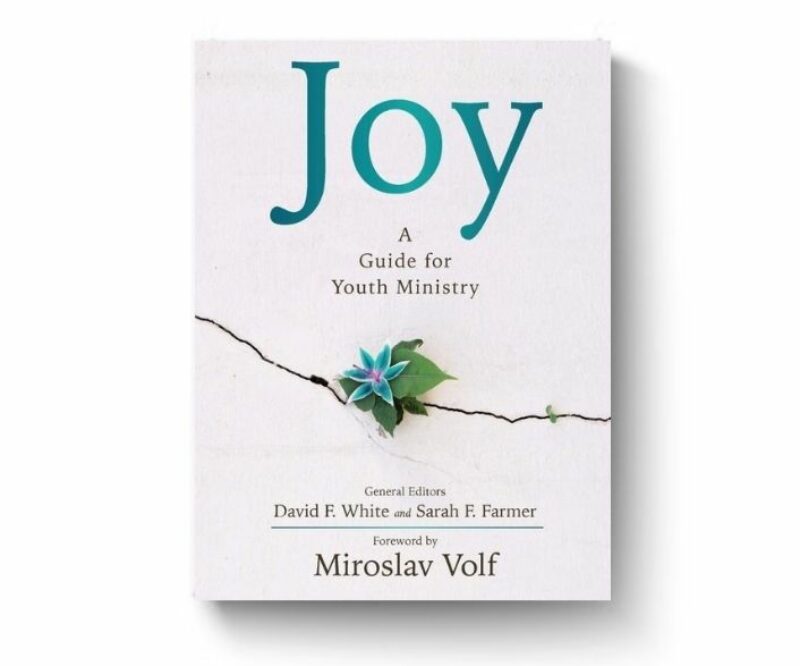Citation
King, P. E. & Argue, S. (2020). Purpose, Finding Joy in Life Direction. (Chapter and curriculum guide.) In D. White and S. Farmer (Eds). Joy: a Guide to Youth Ministry. Nashville: General Board of Higher Education and Ministry of the United Methodist Church.
Abstract
Published in cooperation with Yale University and taking cues from theologians such as Miroslav Volf and recent reflections on joy as the crown of the good life, this ecumenical group of contributors insists that reclaiming joy for youth ministry is crucial in light of modern secularism, which has eviscerated the world of such things as mystery, wonder, grace, and transcendence. The modern world urges us to work and consume compulsively; to value its creatures only for their use or to serve our egos. While consumption sometimes yields momentary fun or happiness, only rarely does it yield joy. This book contrarily asserts that to reclaim joy is to retrieve a practicable virtue of the Christian faith, express grateful for God’s gracious gifts, move us to worship, and empower us for active love of God and neighbor.
Christian youth ministry has long operated according to a kind of utilitarian pragmatism. Historically, the evangelization of youth was driven by a fear of hell and damnation. Later, young people were nurtured for their utility as the Church of tomorrow or to insure denominational viability. Frequently, youth ministry serves to keep young people safe as adolescent institutions served as a holding environment for truly productive and valuable, adulthood—or, somewhat more generously, to nurture their psychosocial development. Recently, Christian Smith revealed that youth themselves view Christian faith as “benign, moralistic, and therapeutic”—insignificant to interrupt the consumerism and secularity of modern life; focused on certain weak moral ideals; and mostly valuable in moments of crisis.
This book points to a Christian faith that is grounded in a consequential way of life, including substantive moral ethical virtues and a sacramental ontological vision in which all of life participates with God. It focuses on practices that enhance joy by pointing to the contingency of human life and our participation with God’s redemption work for all creation. It grows from and contributes to Miroslav Volf’s recent reflections on joy as the crown of the good life. Hence, this book seeks to restore a focus on Christian faith and youth ministry that necessarily involves a certain way of life, a life well-lived in response to the Creator’s good gifts and the in-breaking kingdom inaugurated by Jesus. At root, a Christian life is ordered by worship and practices that recognize, celebrate, and respond in joy in light of humanity’s contingency and God’s gratuitous liberation of all creation.
An important correlate of this is that, while joy may have social scientific antecedents, it is completed by God’s actions and our participation with God. Thus joy is grounded in a thick web of theological insight and faithful practice. As asserted by many theologians, joy is shorthand for Christian faith. It points to what is essential to faith, and resists youth ministry’s instrumentalization—at the hands of such things as nationalism, consumerism, scientism, ageism, denominational power or fear, and moralisms of all sorts.
Copyright
Year: 2024
Holder: General Board of Higher Education and Ministry.
DOI: https://www.gbhem.org/publishing/publications/joy-a-guide-for-youth-ministry/
Continue Exploring

Joy
Joy as a Virtue: The Means and Ends of Joy (Portugues (Brasil))
Citation King, P. E., & Defoy, F. (2021). Alegria como virtude: Os meios e finsda alegria. (Joy as a virtue: The means and ends of joy). Journal of Teleological Science, 1(1), 117-163. Abstract To grasp human flourishing and thriving, we must understand joy. However, no theoretical models explain the complexity of joy as a fruit of the Spirit, nor fully account for its impact on human life. We suggest that joy is best conceptualized as a virtue, a psychological habit, comprised of characteristic adaptations and given meaning by transcendent narrative…

Joy
Vocation as becoming: Telos, thriving and joy
Citation King, P. E. (2021). Vocation as becoming: Telos, thriving and joy. In Seminary Student Vocation Formation (eds. David J. Downs, Tina Houston-Armstrong, and Amos Yong). Vocation, Formation, and Theological Education: Interdisciplinary Perspectives from Fuller Theological Seminary. Claremont, CA: Claremont Press, p. 185-210. Abstract This volume represents one set of reflections on issues of vocation, formation, and theological education in the first quarter of the twenty-first century. Each of the contributors to the volume is (or was, in one case) a faculty member at Fuller Theological Seminary, an institution that, like many others, has been wrestling seriously with the global…

Joy
Joy Distinguished: Teleological Perspectives of Joy as a Virtue.
Citation King, P. E. (2020). Joy Distinguished: Teleological Perspectives of Joy as a Virtue. Journal of Positive Psychology, 15(1), 33-39. Abstract The most specific psychological literature associates joy with goodness; however, psychological science has no clear means to distinguish one good thing from another or to decipher the degree of goodness required to designate joy beyond subjective or conventional opinion. In order to provide a framework for a science of joy that identifies both the psychological processes that comprise joy and a means of understanding and operationalizing goodness, I conceptualize joy as a virtue of knowing, feeling, and doing what…


